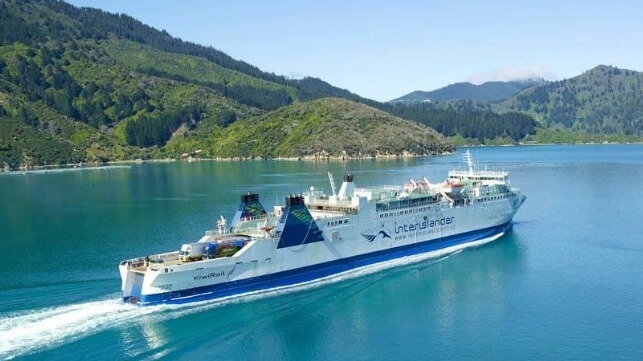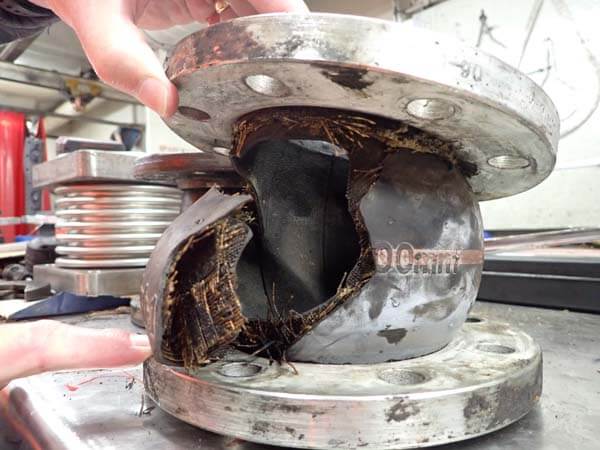New Zealand Prosecutes RoRo Operator for Blackout Due to Maintenance Issue

New Zealand regulators have taken the unusual step of filing charges against the operator of a large inter-island ferry after the vessel suffered a power failure a year ago. The charges now in a New Zealand court came after an extensive investigation by the regulator Maritime New Zealand as well as a critical report from the country’s Transport Accident Investigation Commission (TAIC) which called on Maritime New Zealand to address critical safety issues.
In a preliminary report into the incident aboard the RoRo ferry Kaitaki, TAIC found the operator KiwiRail was not following the manufacturer’s advice or even its own protocols for maintenance. They reported that the operator had installed a 13-year-old rubber expansion joint aboard the ferry in 2018, and by the time it failed in 2023, it was 18 years old. It was both beyond the manufacturer’s recommended age and overdue for replacement under the operator’s procedures.
"The investigation took 12 months; it involved reviewing the operator’s organizational information relevant to processes and procedures connected to safety and maintenance management, undertaking interviews, and examining the Kaitaki after the incident occurred," said Maritime NZ Director, Kirstie Hewlett. "Material was then comprehensively reviewed before the decision was made to prosecute."
The incident began late on the afternoon of January 28, 2023, with 800 passengers and 80 crew aboard the ferry as it was approaching Wellington, New Zealand. KiwiRail promotes that it is “the original Cook Strait ferry,” with multiple sailings each day between the North Island and South Island (Wellington and Picton) carrying passengers, cars, trucks, and rail cars. The trip normally takes about 3.5 hours, but during the crossing, the vessel can be exposed to strong weather conditions. The 2023 trip was no exception with winds of 30 to 40 knots.
The ferry was built in 1995 in the Netherlands and operated till 2001 in Ireland as the Isle of Innisfree before a brief charter to P&O Ferries. KiwiRail first took the vessel on charter in 2005 and acquired it in 2017. The ship is 22,365 gross tons with a capacity for 1,650 passengers as well as 600 cars.

Failed rubber expansion joint was 18 years old and overdue for replacement (TAIC)
On the day of the incident, she departed Picton at 2:00 pm and around 5:00 pm near Sinclair Head as she was approaching Wellington, the vessel blacked out. The crew immediately declared a mayday handing out lifejackets to the passengers. The vessel was drifting toward the rocks, but the crew was able to anchor the vessel. It took about an hour to restore power and the ship limped into Wellington escorted by a tug and docking around 9:00 pm.
KiwiRail confirmed in the days after the incident that there had been a leak in the vessel’s engine cooling system that caused a loss of pressure and automatic sensors shut down all four engines to prevent overheating. The company said repairs were being main and all the components checked. Lloyds Register as the class society also inspected the vessel before it returned to service.
TAIC in its preliminary report found that a rubber expansion joint had ruptured and most of the cooling water drained out before the crew could stop the leak. A review of the ship’s propulsion systems showed there were 12 rubber expansion joints. The one that failed they found had been manufactured in 2005 and sat on a shelf till it was installed in 2018. Two others in use aboard the ship were found to be 13 years old and had also been in use since 2018.
TAIC said the company had failed to track the parts and follow recommendations. They said closer attention was required because it is common for manufactured rubber components to become more susceptible to cracking, delamination, or to become softer or “gummy” as they age.
The company faces a fine of up to approximately US$900,000 if found guilty. News of the charges however has also restarted a debate over the need to replace the ferries. Union leaders and politicians are saying the ferry is too old and like an old car, in time they just do not run anymore.
No comments:
Post a Comment